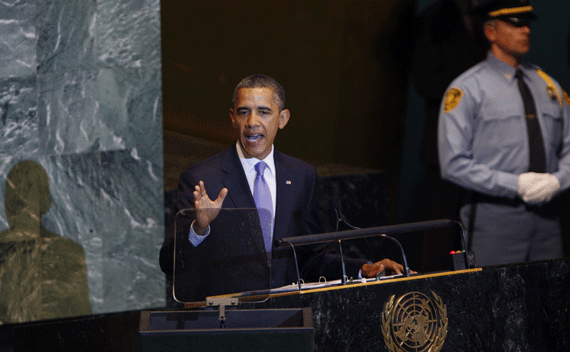The Domestic Politics of Obama’s UN Speech
More on:

One of TWE’s founding themes is that American politics seldom stops at the water’s edge and seldom has. For better or worse, politics infuses our foreign policy choices just as it infuses our domestic ones. That is hardly surprising. Americans disagree, often vehemently, over what America’s interests are abroad and how best to achieve them.
President Obama’s speech to the UN General Assembly yesterday offered a classic example of domestic politics and foreign policy mixing. CFR.org published a quick analysis I did on the substance of the speech, the upshot of which is that the president insisted that Israelis and Palestinians settle their differences through negotiations but he offered no specifics on how to make that happen. That silence was an implicit admission that the White House has few cards to play.
But in defending his opposition to immediate statehood for Palestine, Obama was speaking as much to American voters as he was to the foreign dignitaries sitting in the hall before him. On Tuesday, Rick Perry and Mitt Romney blamed Obama for the Palestinians’ statehood bid. Perry accused Obama of pursuing a "naïve, arrogant, misguided, and dangerous" Middle East policy. Romney charged Obama with having created "an unmitigated diplomatic disaster." The two GOP presidential rivals no doubt want to see more polls showing that disapproval of Obama is growing among Jewish Americans, who happen to be a critical Democratic constituency.
It is hardly surprising, then, that Obama vigorously defended Israel in his speech rather than vowing like last year to seek the creation of a Palestinian state. Nor is it surprising that on Tuesday Obama’s reelection committee launched a subsite dedicated to Jewish Americans that featured a blog post entitled “We’ve Never Had a Better Friend than President Obama.” Or that Anthony Blinken, the national security adviser to Joe Biden, had a letter in the Wall Street Journal on Tuesday defending Obama’s record on Israel. Or that the White House added a bullet to its standard talking points on its achievements at the UN—“a vigorous defense of our staunch ally Israel.”
So sometimes when American policymakers are talking about foreign policy they are also talking about domestic politics. Expect to see that a lot over the next thirteen months and fifteen days.
More on:
 Online Store
Online Store